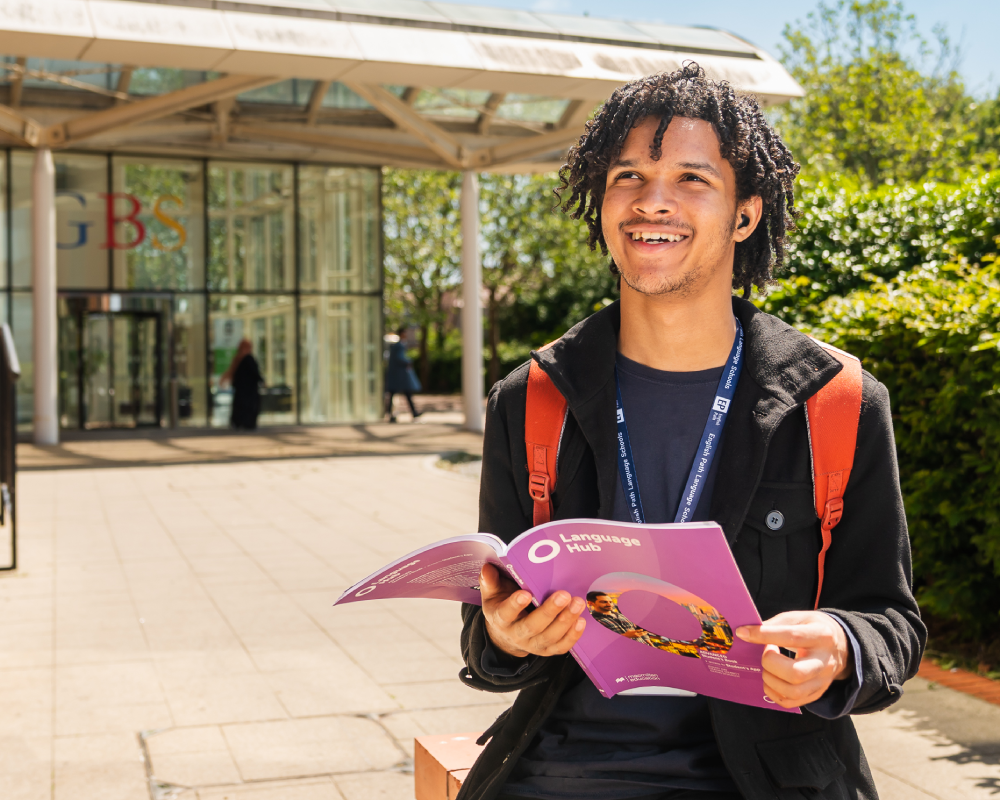To restart learning English after taking a break, you can begin by reviewing what you've already learned in the past. Practise reading simple English texts, start listening to music in English or podcasts for beginners, and talk with other English speakers. It’s important to set small achievable goals and create a routine to practise regularly to get back into things.
Did you take a step back from learning English as a foreign language? When you see your language textbooks gathering dust, do you wonder how you can begin learning again after a break? If you find yourself nodding your head along in agreement with those two questions, then you're in the right place. Coming back to learning a new language might feel tough, but it's totally possible!
When you start learning English after coming back from a break, you'll be surprised at how much you already remember. It's like rediscovering a treasure you thought was lost! With proper time and attention, you can pick up right where you left off. To start you off, we've listed some practical tips below to help you find some motivation, refresh your memory, and set achievable goals so that you can keep moving forward. These tips will help you get back on track with your English language-learning journey in no time.
Tips for learning a foreign language back after a break
It's perfectly normal to feel a bit out of practise when you start learning English as a foreign language again when coming back after a break. The important thing is to come up with a plan to stay on track and get comfortable with the learning process. Follow the tips given below to make learning English a little easier:
1. Don’t rush into things, start slow
Remember, good things take time. If you try to cram everything into a short time period, you'll end up forgetting most of it. Start small and set up a language learning routine. You can begin with simple exercises or start by reviewing your old English textbooks.
2. Create a schedule and set realistic goals
Create a plan and break down your English language learning goal into clear, smaller, and realistic tasks. This will help you visualise what you want to focus on, where you are in the learning process, and where you want to go. It’s a great way to track your progress. Remember, you can also make adjustments to the plan along the way to fit your learning needs.
3. Consistency is key
If you master the English language, it's important to practise a little bit every day, even if it's only for a few minutes. Being consistent with your routine will help you get back into learning and regain your momentum. Start by spending just 15 minutes practising your English skills daily. It could be reading a book, reviewing your notes, or just learning a few new words every day.
4. Start with the areas you’re familiar with

Rather than jumping into new areas of learning English that you have not explored before, start with what you already know. Practise basic greetings in English, like saying hello and goodbye, memorise common English phrases, and try to use the correct grammar when constructing sentences. Review what you learned before taking the break. It'll help you build the foundation for learning advanced English in the future.
5. Immerse yourself in the English language
The best way to learn the English language after a break is to surround yourself with it! Start reading English texts, writing in English, speaking in English, and even thinking in English! You can also listen to music in English or podcasts and watch films or series with subtitles in English. This will help you form a connection with the language.
6. Mix learning with fun activities
Make learning English enjoyable by adding fun elements to it. You can start by playing games like Pictionary, reading children's books, or adding sticky notes to different objects in your house to learn their names in English! It's time to get creative and make learning English fun with films, music, dumb charades and other activities you can think of or come up with your friends!
7. Find a learning buddy to practise
Learning becomes fun and interesting when done with a partner. You can find another language student or ask your friends or even family members to learn English with you. They can help you practise your speaking and listening skills, keep you motivated, and hold you accountable when you get something wrong. Together, both of you can learn a new foreign language!
8. Don’t forget to celebrate your achievements
Learning a new language can take time, which can feel slow and frustrating. But it's important to recognise and celebrate any progress you make, no matter how small it is. Each small step you take is a victory in itself, and it's worth celebrating! Take yourself out for something you enjoy, like a coffee or watching an episode of your favourite TV show, as a reward for learning, even if it's just a couple of English phrases.
9. Don’t take another break anytime soon
When you stop learning any language for a while, be it English or any other, it can be tough to get started again. But if you stop again soon after starting, it'll be even more difficult to begin again. So, avoid taking another break again if you can and try to keep learning! Plus, did you know that in English Path, you can choose your study duration, which can be anywhere between 1 week and 1 year!
10. Join English Path to begin learning a new language again after a break

An experienced and qualified teacher can help you get your language learning back on track, and at English Path, we have a whole team of them! We offer a wide range of courses for learners of various ages and levels to help them master the English language. You can choose the one that best fits your learning needs and style. Explore our English language programmes for adults, such as General English, Business English, IELTS preparation and many more!
I have been with EP for one month. I chose London to study English because, first, it's a huge city and I knew I was gonna have lots of things to do every day and also because I had heard so many things about EP London, so I wanted to try it. My favourite thing about EP London is meeting people from all over the world, like different nationalities. I came here to learn English and improve my English, and now I speak Japanese. I would 100% recommend EP to other people. Like, amazing! It was way above my expectations. I knew it was gonna be good, but it was perfect."
Gustavo - Brazil
Tips to stay motivated when learning English
English is a funny and complicated language. Learning it at times can feel like a chore and soon become a frustrating process. Therefore, it’s important to find ways to keep yourself motivated. You can start with the following tips:
- Remind yourself why you wanted to learn English in the first place. Do you want to travel the world, unlock global career opportunities, or just learn for your own personal growth? Remembering these reasons and your study goals will help you stay motivated.
- Keep finding ways to stay inspired. You can start by surrounding yourself with inspiring content in English. This can be famous quotes from books, renowned personalities, or just the internet.
- Learning a language should be an enjoyable experience. Don't be afraid to make mistakes. The more you start enjoying the learning process, the easier it will be to complete your daily tasks and achieve your English language goals.
Taking a break from learning English is completely normal. Remember that it may feel difficult in the beginning, but it's highly possible to pick up where you left off. The goal is not about how fast you can learn the language but more about taking time each day to practise your English skills and enjoy the journey. You can also join English Path to make this journey an even more memorable experience. With us, you will not only learn English but also have an amazing time exploring new places around the world, like London, Manchester, Birmingham, Leeds, Dublin, Malta, Toronto and even Dubai!
Frequently asked questions about how to learn English as a foreign language after a break
Q1. How do I restart learning English after a break?
Q2. How can I improve my English pronunciation after a break?
Pronunciation is a tricky thing, but with regular practise, you can master it! You can start by listening to English films and try to mimic their pronunciation. Pay attention to how English words are said and what sounds are used so that you can practise saying them out loud later.
Q3. What if I make mistakes when speaking English?
Remember, making mistakes is a natural part of the learning process! Every person who has ever learned a language, including native speakers, has made mistakes and maybe still does. But what’s important is not to be afraid of them; rather, take your mistakes as opportunities to learn and improve your English skills.
Q4. How often should I practise English to see results?
You cannot learn English in a single day. It’s a time-consuming process, and to see any results, you must practise regularly. During your day, set some time aside to practise, even if it's only for 10 minutes. By regularly practising, you will be able to see visible results in a few weeks.
Q5. Where can I find a supportive community of English learners?
At English Path, you can join a supportive and nurturing community of English learners. By enrolling in our courses, you will be learning with students from different backgrounds and from different parts of the world. Explore our wide range of courses to choose the one that best fits your learning needs.
